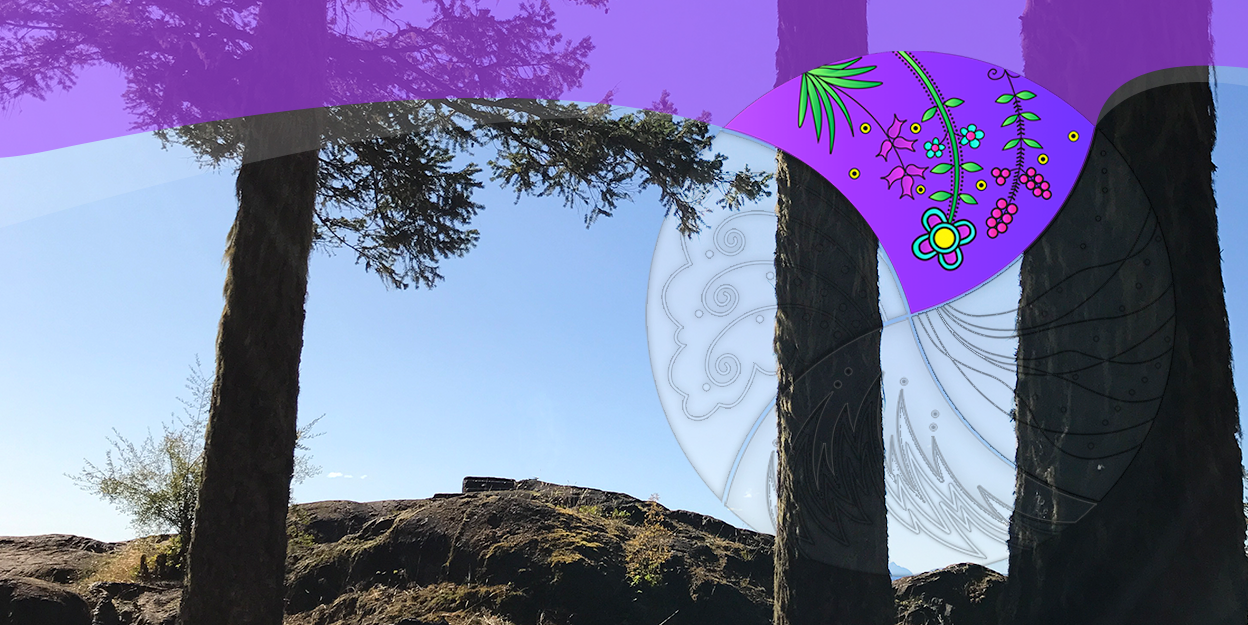Project Brief
This project affirms the leadership role of M’Wikwedong Indigenous Friendship Centre as a physical and symbolic teaching lodge for climate action and land stewardship within the traditional territories of Saugeen Ojibway Nation in the city of Owen Sound, Ontario. The purpose of the teaching lodge is to support Indigenous community members in restoring relations with the land through collective healing, knowledge sharing and relationship building. The name of the project comes from the Anishinaabemowin words ‘Gikinoo’amaagewin’ (Teaching) and ‘Wiigwaam’ (Lodge).
The first phase of the project sought to establish a collective vision among M’Wikwedong’s staff and Board of Directors on how the Centre’s programming and infrastructure can align with practices and principles of urban land stewardship. As part of Erica Shardlow’s Master’s thesis, in-depth semi-structured interviews were conducted, where participants shared their thoughts on which kinds of programs, cultural teachings, events and infrastructure could enhance relationship building with the land, especially for children and youth.
Given that A SHARED Future is winding down, our team is preparing to move on independently for the second stage of Gikinoo’amaagewin Wiigwaam. Lorne Pawis, the Cultural Resource Coordinator at M’Wikwedong, and Diane Giroux have offered guidance for designing this next stage, which aims to determine the priorities of self-identified Indigenous community members on cultural teachings and land-based programs at M’Wikwedong.
Rationale
The current global climate crisis poses the need for immediate and systematic actions to reduce emissions and foster healthy environments for all. For the Canadian context, the energy transition needs to take place in a way that contributes to redressing – rather than perpetuating – the ongoing settler colonialism that continues to inflict systemic damage on Indigenous peoples and their lands. For Indigenous communities who make urban environments their home, exerting their leadership within energy transition can prove challenging due to limited resources and high service demand. Yet, there are examples that show that urban Indigenous communities have a rich potential for developing and mobilizing innovative knowledge and action for creating healthier and more sustainable urban environments (Indigenous Climate Action, 2018).
Research Process
Our research methods are organized according to four overlapping phases. Phase 1 centres in ongoing gender and safety reflexivity. The Research Team and Advisory Committee will convene to discuss potential harm that participants might experience as this project unfolds and identify potential solutions. The team will strive to ensure the best conditions for Indigenous women, two-spirit and gender-diverse participants to exert their leadership and share their gifts through this project. Phase 2 will centre in creating time and space for Indigenous community members to learn from Indigenous and Western knowledge on climate transitions and co-creating a shared community vision for climate action and land stewardship in their community. Conversations may revolve around M’Wikwedong’s new facilities, transitional housing complex, or other emergent priorities of community members. 1-5 construction and energy experts may be invited to participate in each of the activities of this phase so that they can learn from the priorities of Indigenous community members. Research activities stem from M’Wikwedong’s programming and include a community feast, cultural workshops, and knowledge sharing about Indigenous and Western understandings of climate change. Phase 3 focuses on building support for M’Wikwedong’s projects. An inter-agency meeting will be organized to discuss intersectoral opportunities for collaboration and commitment in relation to M’Wikwedong’s climate action projects. Phase 4 centres on sharing knowledge with other Indigenous and non-Indigenous communities that are external to M’Wikwedong. Research activities include knowledge-sharing events that bring the urban Indigenous community in Owen Sound with the on-reserve communities of Saugeen Ojibway Nation and walking tours that showcase M’Wikwedong’s journey through this research project./p>
Project Outputs
This project has resulted in the publishing of Erica Shardlow’s Master’s thesis, which advanced insights on how urban Indigenous land stewardship at M’Wikwedong can operationalize environmental repossession in cities. Given M’Wikwedong’s recent move to a larger facility more central to downtown Owen Sound, Erica’s thesis highlighted staff-led ideas for how the new facility could be reimagined into a space for urban land-based teaching and learning (ideas included planting on-site trees and gardens, building an outdoor lodge, expanding traditional harvesting, and hosting intergenerational events with Elders and Knowledge Holders). We are currently developing knowledge translation products based on Erica’s thesis, including a community brochure.
Carlos and Diane having lunch by Georgian Bay.
M’Wikwedong’s Main Room
From M’Wikwedong Indigenous Friendship Centre: Paul Nadjiwan, Karen Houle, Diane Giroux, and Renee Abram; from the Centre for Environmental Health Equity: Jeff Masuda, Carlos Sanchez, Anna Anbalagan, and Julia Moreau; from Western University: Diana (Dee) Lewis
Intended Impact
Our hope is that this project will support M’Wikwedong in pursuing its climate action and land stewardship agendas in close relationship with the community members they work with. Additionally, we hope that other Indigenous and non-Indigenous communities will be able to learn from M’Wikwedong’s experience regarding the following areas: 1) culturally-relevant gender accountability for climate action projects, 2) community-driven action research processes, 3) reconciliation of Indigenous and Western knowledge through research, 4) reconciliation between humans and the land within urban environments.
Funding
Our project is part of A SHARED Future, which was funded through the Canadian Institutes of Health Research, Environmental Health Strategic Initiative Team Grant: Intersectoral Prevention Research (2017 – 2022)
Project Team
Co-Leads
Paul Nadjiwan, Karen Houle, and Jeff Masuda
Team Members
Diane Giroux, Renee Abram, Diana Lewis, Carlos Sánchez, Anna Anbalagan, and Julia Moreau
Advisory Committee
Theresa O’Connor, Susan Staves Schank, Hillary Trudeau, Ron Root, Shane Chegahno, Nick Saunders, Shari Huber, Anne Marie Shaw, Victoria Serda and Helen Doyle
